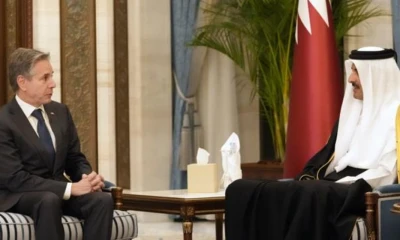Edited by Deepali Verma’
The response to the latest plan for a cease-fire in Gaza and the release of hostages was “generally positive” from Hamas’ front, informed the key mediator Qatar, as the militant group reiterated its demand for an end to the war, something Israel has thus far ruled out.
Qatari Prime Minister Sheikh Mohammed bin Abdurrahman Al Thani made public the response during a news conference with U.S. Secretary of State Antony Blinken, who said that he would brief Israeli leaders on it on February 7 when he meets with them.
Blinken, who met with Saudi Arabian Crown Prince Mohammed bin Salman recently, said the Saudis still come with “strong interest” in normalizing relations with Israel but demand an end to the war and a “clear, credible, time-bound path to the establishment of a Palestinian state.”
Qatar, having long mediated with Hamas, has been working with the U.S. and Egypt to administer a cease-fire that would require a pause in fighting for several weeks and the release of close to 100 hostages still held by Hamas after its Oct. 7 cross-border raid that ignited the war.
Hamas, though in a “positive spirit” to the latest proposal, has said that it still seeks “a comprehensive and complete” cease-fire to end “the aggression against our people”. Hamas is further expected to ask for the release of a large number of Palestinian prisoners such as the high-profile militants, in exchange for the hostages.
Israeli Prime Minister Benjamin Netanyahu has slashed both demands, remarking that Israel is committed to stand its offensive until “total victory” over Hamas and to returning all the hostages. Additionally, he denounced the U.S. calls for the creation of a Palestinian state.
President Joe Biden, in conversation with the reporters said Hamas’ response “seems to be a little over the top” but that negotiations would be continuing.
A U.S. official revealed that Blinken was informed of Hamas’ response to Qatar just an hour before his meeting with the prime minister. The official spoke on condition of anonymity to discuss the behind-the-scenes negotiations.
Blinken recognises that“there’s still a lot of work to be done”. But he said that he still believed an agreement on the hostages was possible and that a pathway to more lasting peace and security in the region was “coming ever more sharply into focus.”
“We are aware of the immense benefits that it holds for everyone concerned with Israel’s further integration into the region, starting with the benefits for Israel,” Blinken said. “That’s something that Israelis will have to decide for themselves.”
Netanyahu’s office said the Hamas response has been conveyed to Israel’s Mossad spy agency and was being “thoroughly evaluated.”
WAR GRINDS ON IN GAZA
Nearing four months of war, the Palestinian death toll has reached 27,585, as per the Health Ministry in the Hamas-run territory. The ministry has no distinction between civilians and combatants in its count but says that a majority of the dead have been women and children.
Hamas along with other militants killed some 1,200 people, most of which were civilians, in the Oct. 7 attack and abducted around 250. Over 100 captives, most of which were women and children, were released during a weeklong cease-fire in November in exchange for the release of 240 Palestinians imprisoned by Israel.
The Israeli military said it was fighting against militants in areas across the Gaza Strip, which includes the southern city of Khan Younis. It informed that the troops killed dozens of militants over the past day, without any evidence.
HUMANITARIAN CRISIS PERSISTS
U.N. humanitarian monitors revealed that Israel’s evacuation orders in the Gaza Strip now cover two-thirds of the territory, or 246 square kilometers (or 95 square miles). The affected area housed 1.78 million Palestinians or 77% of Gaza’s population, before the war.
The daily report of the U.N Office for the Coordination of Humanitarian Affairs, or OCHA, said that the newly displaced have left only about 1.5 to 2 liters (50 to 67 ounces) of water per day for drinking, cooking and washing. A significant increase in chronic diarrhea among children has also been reported.
Parents of babies are facing a particularly tough challenge because of the high cost or lack of diapers, baby formula and milk.

















